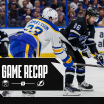Finding the precise balance point on a one millimeter-wide skate blade has been an obsession for Tampa Bay Lightning skating consultant Barb Underhill ever since her dreams of winning Olympic gold were shattered partly because of an imperfect pair of skates.
Helping the Bolts find the 'sweet spot' on a one millimeter-wide blade
After retiring from competitive figure skating, Barb Underhill now works with the Lightning's prospects to refine their own skating technique
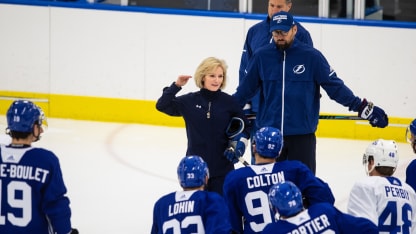
© SCOTT AUDETTE
Underhill and partner Paul Martini were one of the favorites for the gold medal in pairs skating at the 1984 Winter Olympics in Sarajevo having finished as Bronze medalists at the World Championships the previous year.
During their short program, however, Underhill lost an edge and fell, taking out her partner in the process, their dreams of medaling at the Olympics shattered.
"It's just devastating," she recalled. "You've been working for this your whole life."
There was a chance for redemption, though. The World Championships were in three weeks in Ottawa, but Underhill continued to struggle in practice sessions leading up to the event.
"It was so bad that literally almost a week before, we almost quit," she said. "We just couldn't figure it out."
Underhill hadn't felt comfortable with her skates all season. A friend suggested she try the skates she used the previous year. She happened to have them in her car along with a lot of her belongings because she was in the middle of moving. She ran down to the parking lot, put her old skates on and went back on the ice.
"It was like night and day," she said. "And from that moment, we were just perfect."
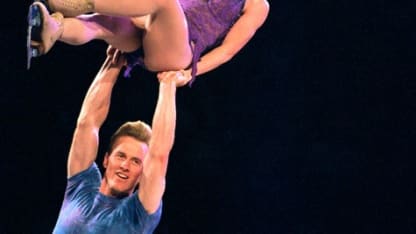
© Stephan Potopnyk
Underhill and Martini captured the gold medal at the 1984 World Championships in their home country, completing an arc from the lowest of the lows to the highest of the highs in her skating career in a three-week period.
"You can imagine when you're flying through the air three times and you've got to land on your blade. If that blade is a hair off, you're blowing out a knee," Underhill said, which she pretty much did, tearing the ligaments in her foot a couple months prior to the Olympics. "That's why I'm obsessed with blades and skates and balance points because that's one of the big reasons why I struggled at the Olympics."
In a lot of ways, Underhill's redemption story mirrors the one the Tampa Bay Lightning completed after defeating the Dallas Stars in six games this September to win the Stanley Cup. Only a year earlier, the Lightning were Cup favorites after breezing through the regular season, winning 62 games to tie the National Hockey League record for most victories in a season.
In the First Round of the playoffs, they were summarily dismissed in a shocking four-game sweep at the hands of the Columbus Blue Jackets.
That failure motivated the Lightning throughout the 2019-20 regular season, kept them focused on their ultimate goal even when the NHL season paused in mid-March due to the coronavirus pandemic, fueled their run through the postseason, which included a five-game First Round victory in a rematch with the Blue Jackets.
"Knowing what that feels like to be just shattered into pieces and have to pick those pieces up and put them back together and then win the World Championship, I kind of know that feeling of being at the bottom and just going inside yourself to figure out how to put the pieces back," Underhill said. "That was a big deal for those guys what they went through last year and making sure that it didn't happen again. What they learned in that process will serve them forever."
---
The breakout star for the 2020 Stanley Cup Playoffs was Brayden Point, who set a Lightning record for goals in a single postseason after scoring 14 to lead all players. Point contributed 33 points, one behind teammate Nikita Kucherov for most in the 2020 Playoffs. His dynamic playmaking ability and elite skating set him apart as a difference maker for a Lightning team that would capture its second-ever Stanley Cup and first since 2004.
Point is probably Underhill's most well-known pupil.
When the Lightning drafted him with the 79th selection in the 2014 NHL Draft, moving up one spot with Minnesota to ensure the Wild wouldn't pick him, it was Point's skating along with his smaller stature that dropped him in the draft and allowed Tampa Bay to take him in the Third Round.
When Point participated in his first Lightning Development Camp a few weeks after being drafted by the team, Lightning head coach Jon Cooper's initial assessment was the youngster struggled to skate. It was the one skill holding him back.
"He had all the attributes. He had the hockey sense, the competitiveness, he had all the hockey player traits you need, except shockingly enough, he didn't have the speed he has now," Cooper said during the Bolts' 2020 playoff run. "All he did was improve his skating. He's gone from an OK, decent skater to an exceptional skater."
To refine his skating, the Lightning sent Point to work with Underhill. She identified the flaws in his technique, showed him where he could make improvements using slow-motion video so he could see where he was going wrong. At Lightning development camp, you'll often see Underhill working with a group of six or so players at a time. She'll demonstrate a maneuver she wants them to perform, then one by one the players will mimic the movement while Underhill skates in front of them, capturing their skating on her tablet.
Once they've taken enough video, Underhill and the players will retreat to the locker room where they'll watch their skating, honing in on how their mechanics work and how their body moves.
"I'm always looking for the blade," Underhill said. "In every sport there's a sweet spot, and the blade has a sweet spot. And so when you hit it, there's no tension on your body because you're completely supported. When you are not on the right part of your blade or if your blade is not quite under you, then there is friction and so there's going to be tension in your body. So I look to find that perfect balance point for a player where the skating becomes effortless, it becomes easy, it becomes more efficient, where they're able to accelerate faster because their body's lined up over the right part of the blade. So breaking things down in slow motion is super, super important to be able to see those details."
With Point, Underhill was able to see how the young prospect was on his heels a lot of the time.
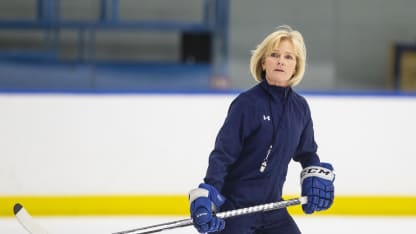
© SCOTT AUDETTE
"He would come out of his turns on his heels. His crossovers were on his heels, so his acceleration wasn't there," she said. "So we made several adjustments to get him -- and some of them were mobility issues, some of them were skate issues -- to get him to the right part of the blade. And with him, as soon as he got there, he just took off. It just all clicked. Jamie Heffernan and the off-ice team were an important part of the process."
It's incumbent on the player too to take the information presented to them by Underhill and work diligently to improve. Not all players do. Most have been successful in hockey their whole lives, so they feel any major refinements to their game or their skating is unnecessary.
Not Point.
He took the information and worked tireless during the offseason to apply the lessons learned from Underhill and incorporate them into his skating. Soon, Point was skating at an elite level. It's one of the main reasons he never played in the American Hockey League, going straight from juniors to the NHL because what he needed to work on before he turned pro, he developed through his internal drive to be better.
"I used to be one of those people that thought if the guy couldn't skate and had an issue with skating, it was going to be a problem that was maybe not able to overcome. But Barb Underhill has made a believer of me," Lightning assistant general manager and director of amateur scouting Al Murray told the Power Lunch show on Lightning Power Play the day after the 2020 NHL Draft. "And oftentimes if we're worried about a player's skating, we'll send clips of it to Barb or Barb will get on the internet and watch the player and she'll tell us. Certain things can be fixed, certain other things are going to be a real problem to fix. She and the development people have done a great job in being able to bring some of these guys along that I thought skating might be too big an issue for. But you know what, it really comes down to the player and the person."
Point is an Underhill success story but certainly not her only one.
"I'd have to say not only has Barb helped Brayden Point, but she's helped numerous players on our team, the (Anthony) Cirellis, the (Cedric) Paquettes, I can go down the list," Cooper said. "The only unfortunate part for us is we don't get to see her as much as we'd like. Barb's a wonderful person to be around, and she explains things and teaches things that just makes sense to the players. Plus, she's a lot of fun to be around out on the ice. Guys gravitate to her, and she knows how to teach. It goes back to the player, the player has to buy into it too. The player has to work at it. But she gives you the fundamentals to do it, the players work with it and guys like Pointer benefit because of it."
---
Underhill's career path has taken her from the ice to the booth and back to the ice as a teacher.
She's a five-time Canadian pair champion and two-time Olympian.
She won gold at the 1978 World Junior Championships with Martini prior to becoming the 1984 World Champions for pair skating.
Underhill was named to the Canadian Sports Hall of Fame in 1988 and the World Figure Skating Hall of Fame in 2009.
After retiring from figure skating in 1998, Underhill became a skating commentator in Canada for 16 years, calling numerous Olympics and World Championships for the Canadian Broadcasting Corporation.
In 2006, her husband Rick Gaetz became part owner of the Ontario Hockey League's Guelph Storm. Dave Barr, the coach of the Storm at the time, asked Underhill if she would work with some of the younger players and help them improve her skating.
She was intrigued.
But she was also very busy. And she had never taught before.
She said yes anyway.
"We retired from skating my partner and I in 1998, so I hadn't really been on the ice in many years," Underhill said. "And just being back on the ice again, I just felt like I came alive. I was like, 'Oh my gosh.' It just felt so good. I've been on the ice since I was five years old, and that's where I felt I needed to be. So I made a decision then to leave broadcasting and to put myself into this and to learn everything I could about it because I really, at that point, I didn't know a lot. I wanted to educate myself and I was just kind of obsessed with figuring the science out. From a very young age, I remember I just wanted to go fast. That's what I wanted. I just wanted to be fast. So I really just became super obsessed with figuring out the science."
As Underhill was figuring out the science of the skating, her husband brought home a video of his golf swing side-by-side with Tiger Woods' as a way to analyze areas where his swing could be improved and be more like Woods.
"I said, 'Wow, I could do that with hockey. I could do that with skating. But I've got to find the Tiger Woods,' Underhill recalls.
Her Tiger Woods was Mike Gartner, a player regarded as one of the best skaters ever in the National Hockey League and a friend of Underhill's. Gartner agreed to let her video his skating technique.
"That was kind of the beginning because I was able to look at his skating in slow motion and kind of figure it out," Underhill said. "This is over 10 years ago, so we were just starting to get into technology. Like it was still not really out there. But there was a software that I could use to put a player beside and make a comparison similar to the golf video my husband showed me. I started playing around with that, and that just blew my mind. It really just opened everything up for me and I just started to figure it out.
A year after working with the junior players in Guelph, the NHL's Anaheim Ducks asked if she could help out some of their players. Then the New York Rangers called.
In 2010, she trained Christian Thomas, a Second Round draft pick of the Rangers. Christian's father is Steve Thomas, who was hired by the Tampa Bay Lightning in September 2010 as a player development consultant (he would later become an assistant coach with the Lightning from 2012-16). The elder Thomas watched as his son's skating dramatically improved over the summer with Underhill's tutelage. He told then Lightning GM Steve Yzerman, who had been hired by the organization four months earlier, about Underhill and pushed to hire her.
"Steve (Yzerman) met me and basically we had a meeting and I showed him some video, and Steve was the first one to offer me a contract," Underhill said. "As a woman, there were other figure skaters for sure that were working in hockey, but I don't know that any of them had a contract, so I think I was maybe one of the first. That really meant a lot to me because I just felt like he really trusted me and he really saw value in what I was doing with the players and the fact he was willing to go out on a limb and put me under contract said a lot for me."
---
In 2012, the Toronto Maple Leafs brought Underhill on board as a skating consultant too, a no-brainer move for Underhill since she lived in Toronto. That same season, the Norfolk Admirals, the Lightning's AHL affiliate coached by Cooper, won a North American professional hockey record 28-straight games to conclude the regular season and advanced to the Calder Cup Final.
The Admirals' opponent in the final?
The Toronto Marlies.
"I had just been hired by Toronto, so here I am in the building and it's the final and I don't know where to sit or where to go," Underhill recalled, laughing. "So I kind of went back and forth from the Toronto box to the Tampa box, and I can remember at one point I'm sitting beside Steve and I remember thinking, 'I better put several chairs between us because I don't want to end up on the screen. That would be really awkward."
The Admirals won the Calder Cup, sweeping the Marlies in four games and winning Game 4 in a 6-1 rout. On that team were future Lightning players Ondrej Palat, Tyler Johnson, Alex Killorn, Cory Conacher, Richard Panik, Radko Gudas and Mark Barberio.
The following season, the Lightning switched AHL affiliates from the Norfolk Admiral to the Syracuse Crunch. In the fall while Underhill was working with the Lightning's prospects in Syracuse, Cooper called her into the locker room for the player meeting before practice.
When she came into the room, Crunch captain Mike Angelidis stood up and gave a speech thanking Underhill for all of her hard work in helping the team achieve its goal.
Then he presented her with her Calder Cup championship ring.
"That was a really super cool moment in front of all the guys," Underhill remembers fondly. "Super cool."
Underhill continues to work for both the Lightning and Maple Leafs organizations, both teams aware of her relationship with the other.
"It does get awkward at times for sure," she said. "I try to keep it very individual, very separate. Basically, I'm working for the players. I'm trying to make the players better, so it's worked out so far."
Logistically, it would make sense for Underhill to devote all her time to the Maple Leafs. The AHL Marlies play in Toronto. It would be a quick hop on the Gardiner Expressway from her home to train both the minor league club and the big league team in their home arenas. With the Lightning, she has to fly to Tampa or Syracuse.
But the Lightning were the first team to offer her a contract, and that initial leap of faith has never been forgotten.
"I feel so invested with the Lightning and have so much history there from the beginning that it was just too hard to leave, so I just decided to stay with both," Underhill said. "They gave me a shot and they trusted me and had faith in me and I always felt like they really bought into what I was doing and I felt really a part of that organization."
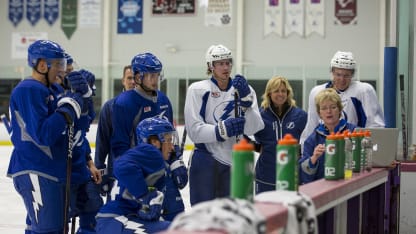
© SCOTT AUDETTE
Early on in her tenure, Underhill and her family were vacationing in Mexico with the family of Tracy Tutton, her best friend from grade school and a figure skater herself. Underhill and Tutton both grew up in Oshawa, Ontario. They met in seventh grade, went to Eastdale Collegiate Institute together. They both skated at the Oshawa Skating Club and had the same coach.
Tutton was teaching figure skating at the time of her trip to Mexico but expressed a dissatisfaction with her job to Underhill.
"I said, 'You should join me and get into hockey because there needs to be more of us,'" Underhill recalled.
Tutton began coming to Lightning development camps along with Underhill, the two taking the prospects through their paces side by side.
"There were so many guys, so she would be on one pad and I'd be on the other pad," Underhill said.
Two years ago, Tutton signed her own contract with the Lightning.
"Here we are both together," Underhill said. "It's a pretty cool story. We couldn't have dreamed this one up."






